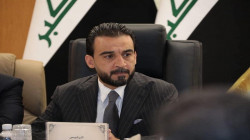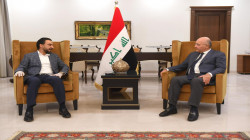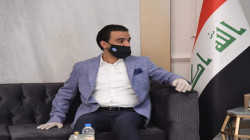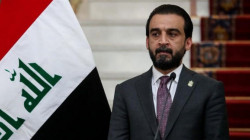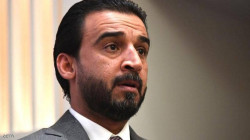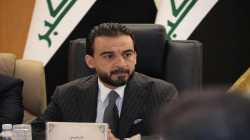Mohammed Al-Halbousi and the Sunni House's leadership
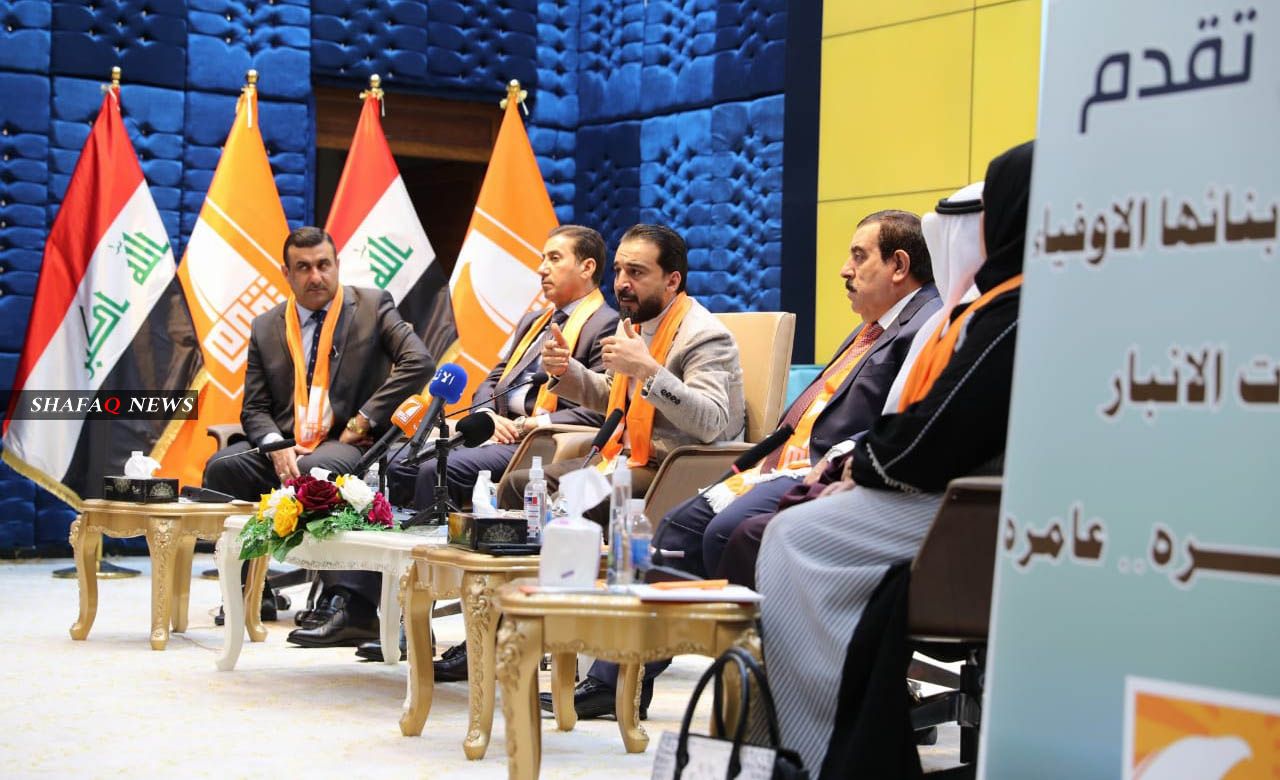
Shafaq News/"What does not kill you makes you stronger", this saying seems to apply to the council of Representatives' speaker, Mohamed Al-Halbousi. He recently survived a political storm aimed to remove him, and emerged from it more powerful and skillful to play more political roles in new demographic arenas, in preparation for the early elections, and seeking to resolve the battle of the Sunni House's leadership.
According to observers, Al-Halbousi's meeting in Ramadi with his electoral base -from Nineveh and Al-Anbar, is only an obvious step following his political victory over attempts to remove him from the parliament's presidency -by the Iraqi Front bloc led by Osama Al-Nujaifi.
But recent moves also point to Al-Halbousi's shift from defense to political attack as observers see his attempt in the short term to expand his popular base -in preparation for early elections in June, particularly in Mosul, the main stronghold of Al-Nujaifi.
In the long run, it is estimated that Al-Halbousi's maneuver is part of the idea-project of the Sunni Region's leadership.. an initiative that has been talked about for many years, but is gaining a new opportunity and a different more sensitive meaning in recent months; as it comes from the first Sunni figure in the Iraqi rule's structure.
It may be a decisive plan in Al-Halbousi's march to effectively act as the first strongest Sunni leader in Iraq; a possibility that has its internal repercussions, and would ring the alarm bells of his political rivals -or those aspiring to play this role now and in the future.
Al-Halbousi had aborted Al-Nujaifi's front's attempts to remove him and succeeded in neutralizing the secretary-general of the Arab project, Khamis Al-Khanjar's position. The secretary-general of the Al-Jamaheer Al-Wataniya Party (the National Crowd Party), MP Ahmed Al-Jubouri (Abu Mazen), announced his withdrawal from Al-Nujaifi's front's bloc -despite its pledge to remove Al-Halbousi.
The Iraqi Front was made up of 35 deputies from Sunni blocs (the Salvation and Development Front headed by Osama Al-Nujaifi, the Iraqi Islamic Party headed by Rasheed Al-Azawy, the Arab Project headed by Khamis Al-Khanjar, the Al-Jamaheer Al-Wataniya Party headed by Ahmed Al-Jubouri, and the Independent Iraqi Bloc) to overthrow Al-Halbousi. The front obtained 100 parliamentary signatures from Sunni, Shiite, and Kurdish blocs to dismiss Al-Halbousi after accusing him of failing on the main issues and problems facing the Sunni component.
Al-Halbousi dealt calmly and patiently to contain the political-parliamentary onslaught and managed to dismantle its joints with the gradual departure of key leaders. The media discourse in which Al-Halbousi addressed his coalition, the Iraqi Forces Coalition, was effective as he described the campaign against him as a "struggle for office and a media whirlwind".
"We had hoped that the Iraqi front would be formed according to the projects and aspirations of liberated governorates; through the return of the displaced, the fate of the absentees, the restriction of arms by the state, the cessation of outlaw bands in the liberated provinces, and the provision of a suitable environment for the upcoming elections", Shafaq News agency quoted Ra'ad Al-Dahlki, deputy chairman of the parliamentary Iraqi forces Coalition bloc.
It seems that the offensive initiative has moved to Al-Halbousi's camp, "The Sunni community needs a political reference and Al-Halbousi, Speaker of the Iraqi Parliament and the Al-Takadum Party's leader, has all the qualifications to be at the head of that reference.. the next stage will clarify this reference's picture more", Ali Al-Issawi, a leader in the Al-Takadum Party told The Shafaq News agency.
"The Al-Takadum Party has offices in Al-Anbar, Nineveh, Saladin, Diyala, Baghdad, and Basra.. We want to replicate the reconstruction that has taken place in Al-Anbar -after it was destroyed by ISIS, to all the Iraqi provinces", Al-Issawi added.
"Al-Halbousi has begun to move towards figures who did not participate in political work before -but have popular bases in Nineveh and Saladin; to have a political, parliamentary, and popular balance that crosses his city, Al-Anbar.. He will have an asset in some Shiite areas as well", Iraqi political analyst, Ahmed Al-Sharifi, told Shafaq News agency.
Al-Halbousi held a meeting in the Al-Takadum Party's headquarters (located in the north of Ramadi) with several Nineveh's leaders, "Al-Anbar's local government's members and many parliamentarians (representatives of the governorate), including, Haibat Al-Halbousi, Adel Al-Mahlawi, Yahya Al-Mohammadi, a number of the province's sheikhs and elders, and the Al-Takadum party's office's directors. The meeting was closed, and no one was allowed to enter", a source told Shafaq News agency.
According to Al-Sharifi, "Al-Halbousi has a leadership charisma, and has influence and support of not only the Sunnies; but the Shiite street as well.. and when he speaks on behalf of Sunnis, he represents the Sunni component's civil wing".
Ahmed Al-Hamdani, Iraqi political expert and a professor at Mosul University, told Shafaq News agency, "Al-Halbousi's movements outside his main stronghold in Al-Anbar, and his trend towards Nineveh and Saladin has upset his opponents and even his political partners -as he aims to withdraw part of their supporters, like Osama Al-Nujaifi and Abdullah Al-Jubouri.
"According to data, Al-Halbousi will be the best Sunni politician in Iraq, and he will be the Sunni political house's leader; especially since his rivals have failed over the past years in many files.. Al-Halbousi has regional, Gulf, and American support -unlike the other Sunni politicians; hence he has achieved political, popular, and international assets to be the Sunni political reference", Al-Sharifi commented.
It is known that partisan and popular forces in Al-Anbar and Sunni-majority provinces are seeking to establish a territory within federal Iraq; aims to reduce the central control of these provinces' capabilities. Al-Anbar's sheikhs refused to call it "the Sunni territory" to remove sectarianism, as they stressed that the new territory includes all components and sects under a unified Iraqi identity.
Constitutionally, the idea seems a natural and possible step, while the political and security aspects may prove to be more complex and difficult than many would hope. The demographic reality in Al-Anbar -and other predominantly Sunni governorates, imposes the fact that the movement is Sunni in nature, and the limits of its political movement are Sunni-based. It may provoke a lot of apprehension and caution, both in Baghdad and in other Iraqi provinces.
Opponents of the Sunni territory's idea may argue that unlike the experience of autonomy in Kurdistan, where the Kurds are integrated with various ethnic groups such as Turkmens, Arabs, Assyrians, Chaldeans, Armenians, Yazidis, Zoroastrians, Kaka'is, Baha'is, and Shabak people. The emergence of ISIS in western Iraq nearly seven years ago may have dealt a severe blow to hopes of a new region.
In October 2020, a Sunni parliamentarian revealed to Shafaq News agency that the massive and unprecedented reconstruction revolution in Al-Anbar is the result of a preliminary plan to make the province the capital of the Sunni territory scheduled for next year.. due to security chaos in many Sunni provinces and sectarian resentment over the presence of forces outside the Iraqi police and army.
The new Iraqi Constitution -adopted since 2005- allows the governorate's people to establish their territory per article 116 of the Constitution which stipulates that "The federal system in the Republic of Iraq consists of the capital, territories, decentralized provinces, and local administrations".. while article 119 refers to the right of one or more provinces to form a territory at the request of a referendum; provided that the application is submitted by one-third of the members in each of the provincial councils or tenth of the voters in each province.
Nevertheless, the idea of a "Sunni region" may take a different curve when its trajectory converges with the competing regional fault lines. Saudi Arabia and the UAE are reported to be supporting the project, as Al-Anbar is witnessing a significant reconstruction revolution.
"The Sunni region is a scheme supported by the United States and Gulf and regional countries -most notably Saudi Arabia, Bahrain, and the UAE to make Al-Anbar similar to the Gulf cities ", an anonymous parliamentarian revealed to Shafaq News agency.
